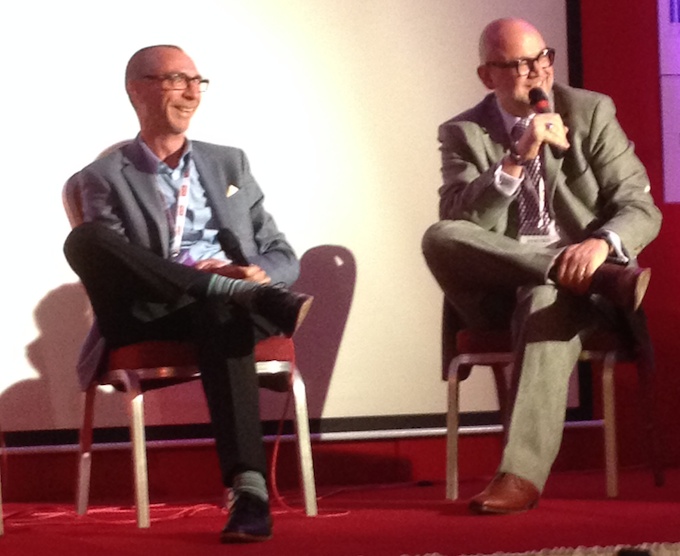TATOC 2017 Conference round-up: International Industry Panel
In the second of our reports on the highlights of the 2017 TATOC conference, LEIGH CONNELLY reports on the International Industry Panel discussion.
The organisers of the TATOC annual member and industry event always make the best use of experts who have travelled from near and far to join the conference. Each year, a selection of delegates are invited to join the International Industry Panel, with this year’s panellists being: Francis Taylor (CEO of Dial An Exchange), Robert J Webb (Partner at BakerHostetler), Janice Anderson-Pearne (Vice President of Client Services at Interval International) and RCI’s Dimitris Manikis, Vice President, Business Development for RCI Europe, Middle East, and Africa. The Panel session was held in a question and answer format, with conference moderator, Robin Mills, Chairman of Club Leisure Group, asking various questions before giving delegates in the audience the floor.
Adjustment to change
The first question was regarding adjustment to change, as Mills asked each panellist what their respective companies were doing to adjust to the changing marketplace.
Taylor – DAE: DAE is now 20 years old, and looking back to how the industry was then, there were only weeks; no points products. We adapted in the way we serviced members, and now handle all sorts of products. People don’t want to do the same thing every year, this has changed over time and people want to have lots of different experiences. We have to keep looking forward at how we can add value.
Anderson-Pearne – Interval: In our case, we have had forced change, as we were spun off from a parent company. This process made us think deeply about what Interval could become. We now have vertical integration and can own our member experience all the way through. Selling to a new generation is hard, but we persevere.
Mills: I’m aware that RCI has been going through a process of making things simpler (for members).
Manikis – RCI: We have been around for almost 45 years and, in our case, we have not changed quickly enough. We know that we need to work faster and we have plans to do so. I believe that our competitors are not in this room, but are online. Expedia, Booking.com, these are our competitors and they want our business. We have to adjust and so we have been making things simpler. We know that if it takes five minutes to book a holiday on Booking.com, it has to take 4.7 on rci.com.
Mills: I understand ARDA ROC has gone through tremendous change.
Webb – BakerHostetler: Contributors to ADRA ROC care about vacations and we are starting to see the rise of the timeshare owner. We have always cared about our customers as much as our developers, but now we think their perspectives need even more weight. We are asking owners to be our partners. We need to get over issues like exit routes. Yes, it will be painful, but owners want it and the product demands it. It’s a big step forward and owners, developers and the industry all have to work together.

Francis Taylor and Dimitris Manikis during the panel session
Understanding our competitors
Mills: And the likes of Airbnb, are they our competitors?
Manikis – RCI: I recently chatted to a friend who had stayed at an apartment through Airbnb. He asked why would he purchase a timeshare when he could do this? I explained that timeshare resorts are run professionally, with full adherence to health and safety regulations and are professionally vetted. I asked how much money he would put on his family. Because staying somewhere unvetted is just this – risking your family’s safety. Competition is great if everyone plays by the rules. When people aren’t paying taxes, is that fair? If everyone is regulated, then I am the first to say we welcome competition. If we all play fair, everyone is allowed to play and win.
Taylor – DAE: Timeshare is a small part of holidays. It’s limited. For instance, if you need to go to a wedding, and there is no timeshare inventory, you are going to look for a deal, and all accommodation is an option, even a B&B in a pub is an option if it is in the area where you need to stay. Airbnb adds something for all of us.
Webb – BakerHostetler: I object to companies deciding that, despite taxes and legislation, they will do what they like anyway. The lawyer in me objects, not because I don’t support change, but because I support contracts. There are places for everyone if they are willing to develop legislation. With regards to Airbnb, I don’t like its lack of legislation, but what they are doing is exciting.
Anderson-Pearne – Interval: A lot of millennials are starting to get a little bit bored of the internet and always trying to figure out for themselves what is best for them. What we have, if it can be fine-tuned, is something that would then be appealing to these people.
Robin Mills then welcomed questions from the floor.
New markets
Harry Taylor – CEO, TATOC: I was recently invited to Sri Lanka to give a speech on the good and bad of timeshare. Right now, what is happening in the UAE and China, is there any new action to get business in these areas?
Manikis – RCI: Dubai is currently talking about legislation. If that’s not there – there can’t be timeshare. This is something that we have been working with Interval International on. Dubai has excellent attractions, theme parks, shopping etc., but we can’t progress until legislation is in place. As for China, Wyndham is big in China. I can see Chinese people buying timeshare. Not resort holidays, but shopping and culture, and group travel.
Taylor – DAE: We are building a good little business in China. We used to have to do so much to suit the Chinese and their travel preferences, group travel, tour busses etc. But now they travel alone, specifically in Australia, New Zealand and the USA. The middle class in China has exploded. Just the other day I was waiting for my flight and I heard eight Chinese airline carriers come in, one after the other. We are also doing a lot in Egypt in terms of development, and India. Timeshare can and is being taken seriously in these parts of the world. As other Asian countries become comfortable with independent travel, they will begin to travel within Europe also.
Anderson-Pearne – Interval: We find the needs of the Chinese member hard to come to terms with. However, it would be great to hone in on it, as the potential is huge.
Taylor – DAE: One issue is that Chinese people tend to want to buy only two years of timeshare.
Domestic markets and the safe haven
Mills: I was shocked in the earlier panel discussion at the question regarding the US possibly seeing a decline in tourism (perhaps due to President Trump). But are we in Europe generally staying in the domestic market, and doing less long-haul travel?
Anderson-Pearne – Interval: There is a safe haven mentality at the moment, due to the degradation of currency, and also matters of safety. The dynamics are changing. People are staying in their home resort because it feels safer. However, this should open opportunity for rentals and sales.
Taylor – DAE: We are all looking for a good deal. It’s never been cheaper to fly anywhere in the world. Right now, unless we are lucky, most of us haven’t travelled the world. The way aviation is changing, in the future, everyone will have. Timeshare is sitting as a great opportunity to continue as a working product.
Webb – BakerHostetler: I’d like to say that the overwhelming majority of us in the US are horrified that any guests might feel less welcome. It’s an interesting notion that people will be staying local – but please don’t give up on the US!
Manikis – RCI: When it comes to looking at trends, in RCI we say, ‘go where the planes go’, because if the business isn’t there now, it will be in five years’ time.
General
Delegate: Many timeshare owners do want to pass their ownership on to their families, but often their families are not interested. How do we get to these people?
Manikis – RCI: My daughter has holidayed in timeshare resorts all her life, and recently she announced that she actually wanted to have my week this year, so that she could go with her friends. Some of my daughter’s friends have even bought timeshare, as they have experienced the benefits first hand.
Mills: Is it product or destination that can make or break the interest?
Taylor – DAE: It’s both. But I think it’s primarily education. Unless we can explain the benefits to them, they don’t understand.
Anderson-Pearne – Interval: It’s education. If we, as the industry, are not creating problems, and members are getting the best out of their timeshares, then this will filter through. We need positivity and the product needs to be flexible and to fit the needs of this generation.
Closing statements
Taylor – DAE: None of us can give up. We are all still passionate about timeshare and we have to stay strong and work together.
Manikis – RCI: I’m more excited 20 years down the line than ever before about working for RCI and so are the Millennials in our company.
Webb – BakerHostetler: All of the agreements are in place to help timeshare get to where it needs to be.




